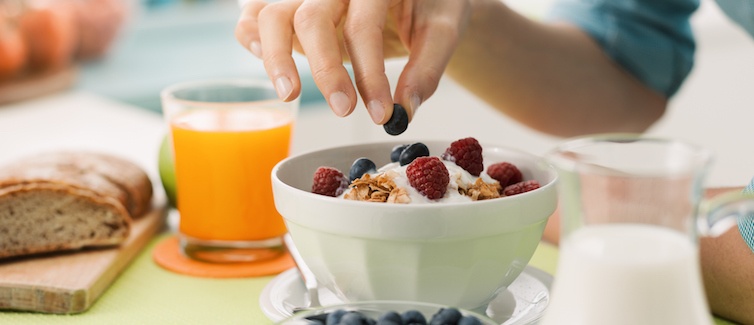Athletes invest a lot of time in training and practice to gain a competitive edge. But it’s not just time spent in the gym that’s important — sports nutrition is also a key element in boosting an athlete’s performance.
Here’s how proper food and meal selection can enhance your hard work:
Start With the Right Fuel
No matter what kinds of daily meals and snacks you choose, they’re only as good as the ingredients — so be sure to start with whole foods. They’ll provide an entire package of complex carbohydrates, proteins, healthy fats, vitamins, and minerals to fuel your body.
Focus on foods like:
- Fresh or frozen fruits and vegetables
- Whole grains and starches, such as oats, barley, brown rice, quinoa, potatoes, and beans
- Lean proteins like chicken, fish, grass-fed beef, and tofu
- Healthy fats like olive oil, nuts, seeds, and avocados
Avoid using processed, packaged foods, which are often high in salt, sugar, and unhealthy fats. Processed foods also create inflammation in your body. That increases your risk of injury and impacts performance and recovery.
Never Miss a Beat!
Subscribe to Our HealthBeat Newsletter!
Thank you for subscribing!
You can now select the specific newsletters you'd like to receive.
You are already subscribed.
Subscribe to more newsletters in our email preference center.
Sorry, an error occurred. Please try again later.
Get Healthy Tips Sent to Your Phone!
Aim for Balance and Variety With Each Meal
Too often, athletes focus on one nutrient: protein. But, balance and variety are equally important. Your body is like an engine — it needs the right mix of protein, carbs, and fat to run well.
To build and repair muscle and boost endurance, make sure you eat a variety of foods each day. Meals and snacks should include a mix of healthy carbs from fruits, vegetables, starches, or grains. Also, aim for 20 to 40 grams of protein each time you eat. That’s the amount you need to stimulate muscle growth and repair.
The grams of protein per pound of body weight needed each day varies by the sport an athlete plays, the level of competition, body composition, and the athlete’s specific goals. Athletes need to consume a balance of lean proteins, complex carbs, and healthy fats at each meal for optimal performance. While eating enough protein is necessary to build muscle mass, eating more than you need doesn’t mean you’ll gain more muscle. And skipping carbs can cost you muscle.
Some balanced meal combinations include:
- Oats with fruit, Greek yogurt, and chia seeds
- A cheese and vegetable omelet with fresh fruit
- Mashed avocado and sliced tomato on whole-wheat toast
- A power bowl with roasted chicken, brown rice, chopped vegetables, and sunflower seeds
- Grilled salmon with roasted vegetables and a sweet potato
Don’t forget to add snacks in between meals. Training burns lots of calories, so including balanced snacks helps maintain your energy levels and weight.
Focus on healthy snacks like:
- Dried fruit and mixed nuts
- A peanut butter and banana sandwich
- A turkey wrap with hummus and shredded carrots
Choose the Right Foods Before and After a Workout
What you eat before and after a workout or event also affects your performance. Make sure you don’t eat anything heavy or too high in fat or fiber immediately before intense activity. It will slow digestion and divert energy from muscles to your stomach.
Before a big workout, choose a light meal or snack that’s high in easy-to-digest carbs plus some protein. A bowl of cereal with fruit and milk — or pretzels with hummus and vegetables — will do the job. Those carbs are essential because they provide glucose to fuel muscles.
After your workout, go for protein but also include easy-to-digest carbs. Eating protein after a workout stimulates muscle synthesis, while the carbs replace glycogen, the stored form of glucose in your liver. Chocolate milk or a protein shake are great options. If you plan to eat dinner shortly after working out, that counts as your recovery snack.
Don’t forget about fluids. Nothing ruins a workout or event like dehydration. A good rule of thumb: If your urine is dark yellow in color, you’re not drinking enough.
Steer Clear of Empty Calories
Finally, remember that you are what you eat. Foods with empty calories contribute to weight gain, belly fat, and muscle loss. It’s OK to treat yourself once in a while. But most of the time, steer clear of junk food and foods that provide calories without any significant nutrition.
Limit foods and beverages like:
- Chips
- Cookies, cakes, or other sweet desserts
- Fried food and fast food
- Sugary soft drinks
- Alcohol
Sources
ISSN exercise & sports nutrition review update: research & recommendations. Journal of the International Society of Sports Nutrition. https://jissn.biomedcentral.com/articles/10.1186/s12970-018-0242-y
Position of the Academy of Nutrition and Dietetics, Dietitians of Canada, and the American College of Sports Medicine: Nutrition and Athletic Performance. Journal of the Academy of Nutrition and Dietetics
About Sports Medicine
An athletic lifestyle carries the potential for injury. Whether you’re an elite athlete or a weekend warrior, UPMC Sports Medicine can help. If you are looking to prevent, treat, or rehabilitate a sports injury, our multidisciplinary team of experts can help you get back into the game. If you are seeking to improve your athletic performance, we can work with you to meet your goals. We serve athletes and active people of all ages and experience levels. Our goal is to help you keep doing what you love. Visit our website to find a specialist near you.
